 |
| May 04, 2021 | Volume 17 Issue 17 |
Designfax weekly eMagazine
Archives
Partners
Manufacturing Center
Product Spotlight
Modern Applications News
Metalworking Ideas For
Today's Job Shops
Tooling and Production
Strategies for large
metalworking plants
3D Printing: Desktop Metal qualifies 316L stainless steel for high-volume manufacturing -- thousands of parts per week
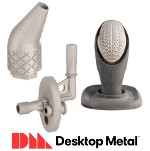
Desktop Metal's 3D-printing Production System can support a throughput of thousands of parts per week.
Additive manufacturing machine maker Desktop Metal has qualified the use of 316L stainless steel for its high-speed metal 3D-printing platform called the Production System, which leverages patent-pending Single Pass Jetting (SPJ) technology designed to achieve the fastest metal build speeds in the market.
Known for its corrosion resistance and excellent mechanical properties at extreme temperatures, 316L stainless steel is well suited for applications in the most demanding conditions, such as parts exposed to marine or pharmaceutical processing environments, food preparation equipment, medical devices, and surgical tooling. It also exhibits excellent weldability by standard fusion and resistance methods.
The Production System platform consists of two printer models: the P-1, a solution for process development and serial production applications, and the P-50, a large-form-factor mass-production solution for end-use parts, scheduled to begin commercial shipments later this year.
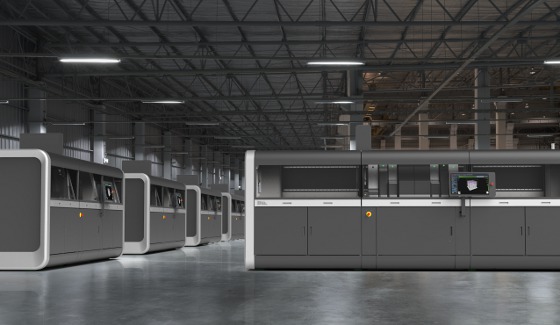
Desktop Metal's 3D-printing Production System platform.
The Production System combines Desktop Metal engineered binders with an open material platform, allowing customers to produce high-performance parts using the same low-cost metal powders used in the Metal Injection Molding (MIM) industry. An inert processing environment enables compatibility with a variety of materials, including the now qualified 316L stainless steel as well as high-performance alloys and even reactive metals, such as aluminum and titanium.
VIDEO: In-depth look: Desktop Metal's Production System walkthrough -- process and features. Very interesting!
"The qualification of 316L stainless steel with leading mechanical properties on the Production System platform is part of our aggressive roadmap to support an array of materials for binder jetting and a testament to the advantages of SPJ technology, which enables mass-production throughput without sacrificing part performance and repeatability," said Jonah Myerberg, co-founder and CTO of Desktop Metal. "With 316L on the Production System P-50, businesses will now be able to leverage additive manufacturing to produce complex end-use parts suitable for use in harsh environments at volumes and costs competitive with conventional manufacturing."

Applications examples: 316L stainless steel
Through extensive testing, the Desktop Metal materials science team has validated that 316L stainless steel printed on Production System technology and sintered by Desktop Metal meets MPIF 35 standards for structural powder metallurgy parts set by the Metal Powder Industries Federation. Parts printed with 316L have demonstrated excellent mechanical properties and corrosion resistance, while significantly decreasing production time and part cost. Specific examples include:
- Rocker arm for salt water marine environments
Rocker arms are used to open and close intake and exhaust valves on an outboard marine engine. The use of 316L extends the part's life and provides corrosion resistance against harsh salt water environments.Manufacturing on the Production System P-50 enables the production of more than a thousand parts per day with ribbing features and cutouts to deliver adequate strength and stiffness while maintaining low weight and a small footprint versus the standard cast alternatives, which require up to 8 to 14 weeks of lead time.
- Fluid connector for chemical processing plants
Heavy industry fluid connectors used in many chemical processing plants need to be manufactured in 316L for corrosion resistance against the chemicals moving through the part. The connector's complex internal channels make it impossible to manufacture as a single component via conventional manufacturing methods.
The Production System P-50 enables printing the fluid connector in 316L as a single, consolidated component and can support a throughput of nearly 5,500 parts per week, at a fully burdened cost of approximately $6.85 per part.
- Customized surgical tool for medical applications
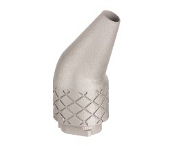
316L is a surgical-grade steel and is an ideal material for medical applications like surgical nozzles.
Because 316L is a surgical-grade steel, it is an ideal material for medical applications like surgical nozzles. By eliminating tooling, additive manufacturing enables mass-production runs of different-size nozzles with no lead time, featuring internal channels that are optimized for individual patient needs.
Printing on the Production System P-50 eliminates multiple fixturing steps otherwise required for machining, and results in a throughput of more than 24,000 parts per week at approximately $2.50 per part. By comparison, machining the same part would cost $20.00 to $40.00 per part and require up to two months to create the same number of parts the P-50 can produce in just one week.
- Gear shift knob for the automotive industry
High-touch parts like this gear knob require materials that are easy to sanitize. 316L is an optimal material choice because it offers excellent corrosion resistance and cleans easily.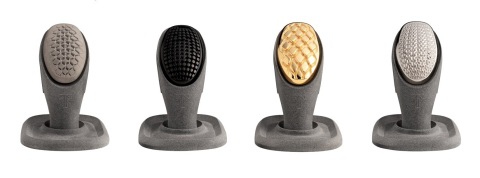
Automotive gear knobs made in 316L stainless steel.
This textured gear shift is an example of mass customization made possible by binder jetting on the Production System, which supports up to 200 parts per build and up to 6,700 parts per week. By comparison, casting would require 8 to 14 weeks of lead time for tooling, just to begin volume production.
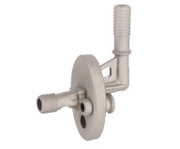
This heavy industry fluid connector in 316L stainless steel was printed as a single, consolidated component.
Learn more at desktopmetal.com/products/production.
Source: Desktop Metal
Published May 2021
Rate this article
View our terms of use and privacy policy
